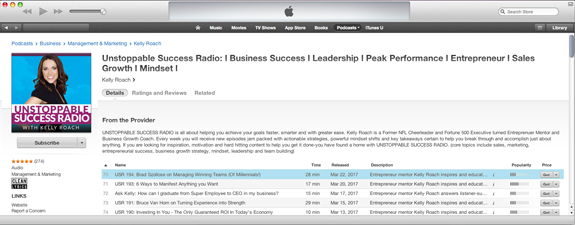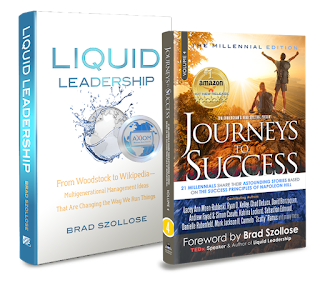Telling a
Millennial that they need to stick to a five to ten year business model
will be met with complete skepticism.
Here’s why:
The reason the business development cycle is
three months out instead
of five years is due to several influences:
digital devices, email and
big data have given us the power to get more work done in less time with
more accuracy.
Technology has also given us the ability to work from anywhere we
want regardless of location even on a modest budget.
Skype for instance
gives a small business access to international videoconferencing for
pennies. This allows smaller startups to compete for the same low
hanging fruit that well-established behemoths used to ignore.
As Olympian Vince Poscente puts it, like it or not, “we are in the age of speed.”
And with that said, any coach, regardless of generation who is still clinging to the 20
th Century models will not survive the milieu of coaches about to join your ranks.
And besides, Millennial business owners want to move fast.
But here is where Millennial coaches and business advisers will have
the hardest time; cracking the generational mindset of older established
business professionals. Let me explain, if we go back in time, to the
70s no one was seeking the advice of a 25 year old. Age determined rank
in the boomer world, and that ideology of age+experience=trust is
present to this day.
Inside EVERY Baby Boomer’s head is something I have labeled the
Career Path Paradigm. At 20 a person was to start in the mailroom. Know
your place in the organization. Sit down. Shut up and listen. Hard work
and sweat would get you noticed. No one is interested in what a
20-something has to say. At 30, you might get noticed and move up in
rank. Stability starts at 30. You were supposed to get married and buy a
house and start a family. By 40 you get a middle management position
and 50 gets you the corner office and a title and keys to the executive
washroom.
Although this model is over, Millennial Coaches will have to overcome
this very real belief still sitting in the nooks and crannies of anyone
over 50.
If you are a Millennial Coach selling to a Boomer, I suggest you
enter with a diverse team made up of Gen X and Boomers. Even if it is
just your advisory team, do it f you want to make the boomer
comfortable.
What about coaching the Millennial-owned startup?
Two close business associates invited me to a breakfast meeting. The
topic?
Could I groom a Millennial business owner? Although the young man
was a genius at 28—his entire business centered around a multimillion
dollar app he had developed. His entire business was a digital product.
As they filled me in, I realized the young wunderkind was intelligent,
but sloppy, said inappropriate things and was inexperienced at business
structure.
My job is to groom this young man for the C-Suite. I have one year to get him ready.
Since I have a deep understanding of Millennials, my job will be simple. For the rest of you, here are a few tips;
1) Millennials are friends with their parents. Use that to your advantage.
What that means is as children they were privy to conversations that
previous generations never had with their parents. This included getting
career advice and mentorship lessons since they were 5. In other words,
Millennials weren’t raised by parents, they were raised by advisers.
The hierarchy in the household was flattened in favor of collaboration.
To work with this generation, become a partner in their success.
Sounds exhausting but a Millennial will need far more hands on than
other clients. Why you may ask? Well, although they had deep
relationships with their parents and teachers growing up, they may not
have the same business polish that was expected of Gen X and Boomers at
the same age.
Huge chunks of knowledge is missing from their experience. And you as
a consultant, a coach, will need to explain why things need to get done
in a certain way in a particular order.
2) Harness their innovation before they get cynical.
Because Millennials are not trained in traditional business
methodologies they break the rules. BUT, they don’t know they are
breaking the rules.
This is a good thing because like any breakthrough
entrepreneur, innovation is what wins the day.
But show them that creating cool products can also go hand-in-hand
with traditional business structures. A Results Only Work Environment is
best for creating an environment that Millennials respect, but at the
same time, celebrate the importance of deadlines and systems.
In a ROWE
environment output is 32% higher than traditional business hierarchies.
Celebrate Innovation and counter intuitive solutions. THAT is what Millennials do best.
The new
Holacracy trend is great and all, but unless you have money
to burn through before that first product takes root, I suggest sticking
to a ROWE model.
3) Build Fast and Sell…BUT, Prepare them for the Long Haul as well.
While you show the Digital Native that you aren’t their grandfather’s
business coach, build a rapport that is based on results. Building a
start-up into a viable company for acquisition is every entrepreneur’s
dream.
And it is a hot trend. BUT, teaching valuable business lessons
that create a lasting legacy is far more important for the future of
your business as well as theirs.
You see, we all work in the One Off environment. But how would you
like to be rehired years later when that young entrepreneur is a leader
at another company? Or creating a deep dive array of coaching services
that grow as the organization grows? For myself I’ve had to add 9 month
and one year programs to my consulting simply because I realized one
workshop, a keynote or a 6 week engagement weren’t really enough to
create a sea change.
For a broad transformation that is felt throughout
the organization, I needed a team, and my team needs to get inside the
organization for 9 months minimum.
Long term, versus short term.
Which do you think is better?
Also, don’t wear a tie. Millennials like to be comfortable at work,
and so should you. I wear a Hugo Boss suit with a fitted dress shirt and
a silk handkerchief with expensive sunglasses.
Even Millennials in
flip-flops appreciate casual elegance.
So get in there. There’s money to be made, and companies to help build.
Click here to get started working on the ROI of your brand now: http://smithdurant.com/get-started/
See you next time...











